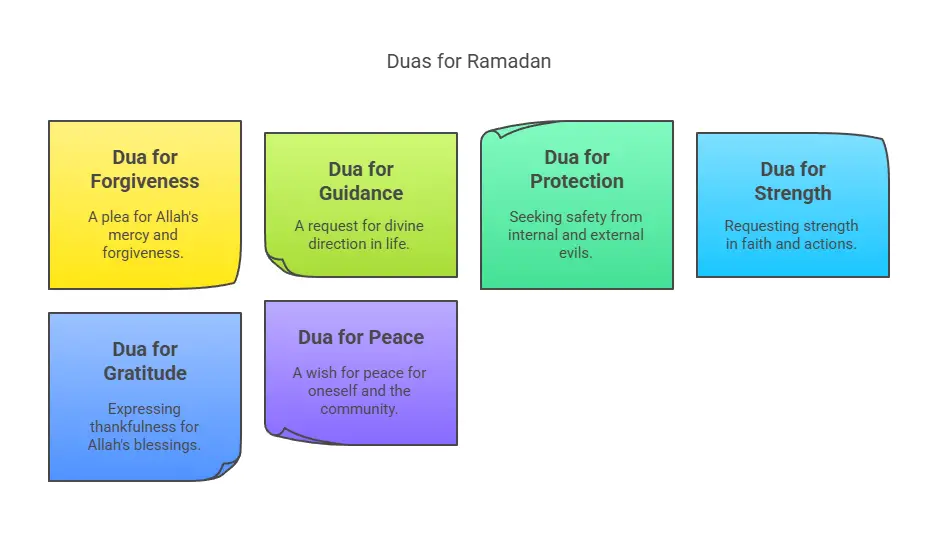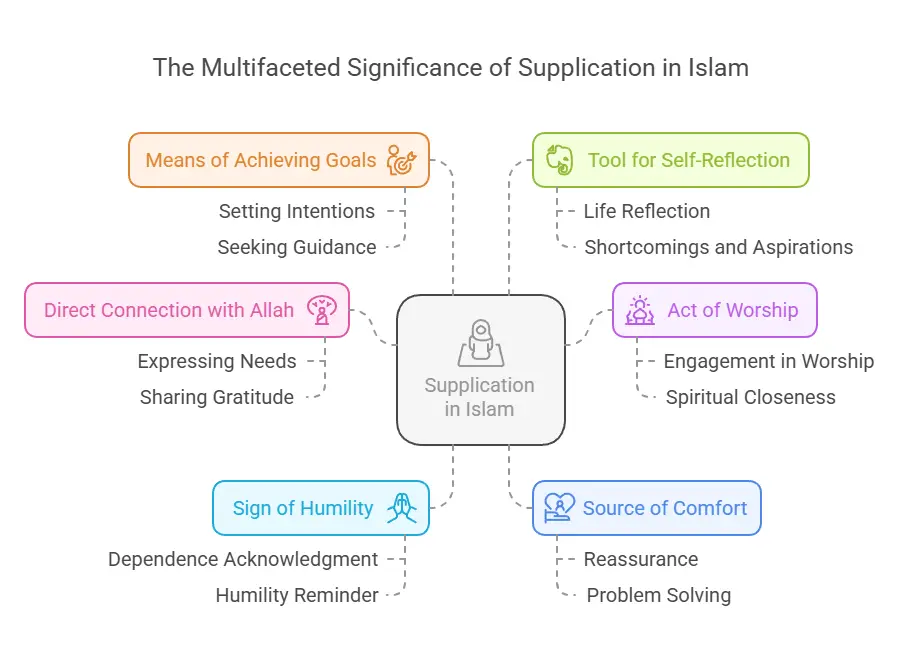
During Ramadan Muslims hold Taraweeh prayers in high regard as one of their most valued religious practices.
After performing the Isha prayer Muslims gain a special chance to bond with Allah through these nightly prayers while seeking forgiveness and reflecting on Quranic teachings.
The core element of Taraweeh prayers consists of heartfelt supplications called duas which believers commonly recite in Arabic.
Muslims who lack Arabic fluency will find their Taraweeh dua recitations in English just as impactful and spiritually significant.
Taraweeh Dua in English
The Taraweeh prayers practiced during Ramadan represent a profound spiritual exercise with the recited duas (supplications) carrying great importance.
Muslims who do not speak Arabic can strengthen their bond with Allah by saying Taraweeh dua in English.
This section examines why English duas hold meaning and investigates popular Taraweeh duas in English while showing how transliteration and translation help people understand and recite them.
Popular Taraweeh Dua in English
Here are some of the most commonly recited Taraweeh duas in English, along with their meanings:
- Dua for Forgiveness:
- English Translation: “O Allah, You are Forgiving and love forgiveness, so forgive me.”
- Significance: This simple yet powerful dua is often recited during Taraweeh to seek Allah’s mercy and forgiveness for past sins.
- Dua for Guidance:
- English Translation: “O Allah, guide me to the straight path, the path of those whom You have favored, not of those who have earned Your anger or gone astray.”
- Significance: This dua, derived from Surah Al-Fatihah, is a plea for divine guidance in all aspects of life.
- Dua for Protection:
- English Translation: “O Allah, protect me from the evils of myself and from the evils of Satan and his whispers.”
- Significance: This dua is often recited to seek protection from internal and external harm.
- Dua for Strength:
- English Translation: “O Allah, grant me strength in my faith, my actions, and my patience.”
- Significance: This dua is particularly meaningful during Ramadan, when the physical and spiritual demands of fasting and nightly prayers can be challenging.
- Dua for Gratitude:
- English Translation: “O Allah, all praise is for You. You are the Light of the heavens and the earth. I am grateful for Your countless blessings.”
- Significance: This dua helps cultivate a sense of gratitude, which is a key theme in Ramadan.
- Dua for Peace:
- English Translation: “O Allah, grant peace to my heart, my family, and the entire Ummah.”
- Significance: This dua reflects the communal spirit of Ramadan and the desire for peace in a troubled world.
Why Recite Taraweeh Dua in English?
People who recite Taraweeh dua in English gain more than convenience because they understand and connect with their supplications. Here’s why it’s important:
Understanding the Meaning: When you say dua in English you understand the words completely. Your understanding enables you to establish an emotional and spiritual bond with the supplication so that your prayers become more authentic and heartfelt.
Inclusivity: Not all Muslims are fluent in Arabic. Taraweeh prayers become more approachable and significant for converts and people from non-Arabic speaking backgrounds when they use English duas.
Personal Connection: Praying in your mother tongue enables you to communicate your personal needs and emotions naturally. Using your personal style of dua strengthens your spiritual connection with Allah.
Focus and Reflection: Understanding the meaning of your prayers helps maintain concentration throughout extended Taraweeh sessions. Understanding your dua’s meaning deepens your spiritual experience.
Encouragement for Newcomers: English duas provide newcomers to Taraweeh or Islam with a means to connect which helps them become more comfortable and confident in their worship practices.
Transliteration and Translation of Taraweeh Dua
Transliterations provide valuable assistance for individuals who choose to recite duas in Arabic yet require pronunciation support.
Below you will find a commonly used Taraweeh dua along with its transliteration and translation.
Dua for Forgiveness:
- Arabic: اللَّهُمَّ إِنَّكَ عَفُوٌّ تُحِبُّ الْعَفْوَ فَاعْفُ عَنِّي
- Transliteration: “Allahumma innaka ‘afuwwun tuhibbul ‘afwa fa’fu ‘anni.”
- Translation: “O Allah, You are Forgiving and love forgiveness, so forgive me.”
Dua for Guidance:
- Arabic: اهْدِنَا الصِّرَاطَ الْمُسْتَقِيمَ
- Transliteration: “Ihdinas-siratal mustaqeem.”
- Translation: “Guide us to the straight path.”
Dua for Protection:
- Arabic: اللَّهُمَّ إِنِّي أَعُوذُ بِكَ مِنْ شَرِّ نَفْسِي وَمِنْ شَرِّ الشَّيْطَانِ وَشِرْكِهِ
- Transliteration: “Allahumma inni a’udhu bika min sharri nafsi wa min sharrish-shaytani wa shirkihi.”
- Translation: “O Allah, I seek refuge in You from the evils of myself and from the evils of Satan and his whispers.”
Your Ramadan nights can become both more meaningful and spiritually fulfilling when you integrate English duas into your Taraweeh prayers.
The essence of your prayer lies in maintaining sincere devotion and mental focus regardless of the language you use for recitation.
The Power of Dua During Taraweeh
Supplication stands as one of the most powerful Islamic worship practices.
The power of dua becomes stronger during Taraweeh because fasting and prayer turn the heart towards Allah.
This section examines the importance of supplication in Islam alongside techniques for effective dua during Taraweeh and recounts inspiring stories of answered duas from these holy nights.
The Significance of Supplication in Islam
Dua is often referred to as the “weapon of the believer” because it is a direct line of communication with Allah. Here’s why supplication holds such a profound place in Islam:
- A Direct Connection with Allah: Dua allows a believer to speak directly to Allah, expressing their needs, fears, and gratitude. It is a deeply personal act of worship that strengthens one’s relationship with the Creator.
- An Act of Worship: The Prophet Muhammad (peace be upon him) said, “Dua is worship.” (Tirmidhi). This means that every time you make dua, you are engaging in an act of worship that brings you closer to Allah.
- A Sign of Humility: Making dua is an acknowledgment of one’s dependence on Allah. It is a reminder that no matter how powerful or self-sufficient we may feel, we ultimately rely on Allah for everything.
- A Source of Comfort: In times of difficulty, dua provides solace and hope. It reassures the believer that Allah is always listening and that no problem is too big or small for Him to resolve.
- A Means of Achieving Goals: Dua is not just about asking for help; it is also about setting intentions and seeking Allah’s guidance in achieving one’s goals. It aligns our desires with Allah’s will.
- A Tool for Self-Reflection: When making dua, we often reflect on our lives, our shortcomings, and our aspirations. This self-reflection can lead to personal growth and spiritual development.
How to Make Effective Dua During Taraweeh
Making effective dua during Taraweeh requires sincerity, focus, and the right approach. Here are some tips to help you make the most of your supplications:
- tart with Praise and Gratitude: Begin your dua by praising Allah and expressing gratitude for His blessings. The Prophet Muhammad (peace be upon him) said, “When one of you prays, let him begin by praising Allah, then let him send blessings upon the Prophet, then let him ask for whatever he wants.” (Tirmidhi).
- Be Sincere and Humble: Approach Allah with a sincere heart and a humble attitude. Remember that He knows what is in your heart, so be honest and genuine in your supplications.
- Be Specific: While it’s okay to make general duas, being specific about your needs and desires can make your supplications more meaningful. For example, instead of saying, “O Allah, grant me success,” you could say, “O Allah, grant me success in my exams and help me achieve my career goals.”
- Use the Names of Allah: Allah has 99 beautiful names, each reflecting a different attribute. Using these names in your dua can make it more powerful. For example, you could say, “Ya Rahman (The Most Merciful), have mercy on me,” or “Ya Razzaq (The Provider), provide for me.”
- Make Dua for Others: The Prophet Muhammad (peace be upon him) said, “The dua of a Muslim for his brother in his absence is answered.” (Muslim). Making dua for others not only benefits them but also increases the likelihood of your own dua being accepted.
- Choose the Best Times: While dua can be made at any time, certain moments are more auspicious, such as during the last third of the night, between the adhan and iqamah, and during Taraweeh prayers.
- Be Persistent: Don’t give up if your dua isn’t answered immediately. The Prophet Muhammad (peace be upon him) said, “The supplication of every one of you will be granted if he does not get impatient and say, ‘I supplicated to my Lord but my prayer has not been granted.’” (Bukhari and Muslim).
- Combine Dua with Action: While dua is powerful, it should be accompanied by effort. For example, if you’re asking for success in your studies, make sure you’re also putting in the necessary work.
During Ramadan Muslims perform Taraweeh prayers which serve as key devotional practices that allow them to deepen their relationship with Allah through nightly worship and supplication.
Learning about the importance of Taraweeh dua in English allows you to enrich your prayers and fully experience the sacredness of this month.





